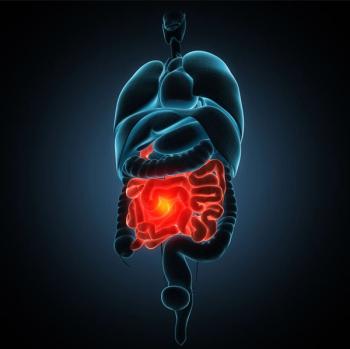
Optimizing Treatment for Patients With IBD
A glance at therapeutic strategies being investigated to improve the treatment and outcomes of patients with ulcerative colitis and Crohn disease.
Episodes in this series

Joseph Feuerstein, MD: Looking at some unanswered questions and future directions, Dr Sands, could you tell us about some of the remaining unanswered questions or unmet needs in the treatment of inflammatory bowel disease [IBD]?
Bruce E. Sands, MD: There are so many questions. Patients will often have questions about the role of diet or nontraditional ways of treating IBD. We’re only just starting to embark on reasonably designed dietary trials to try to answer those questions. It’s a sad fact that even though we’ve made a lot of progress in the treatment of Crohn disease and ulcerative colitis over the last few decades, there are still plenty of patients—I’d say a very substantial minority—who aren’t adequately controlled by the medications we have. We have a lot of trouble predicting which patient is going to respond to which drug. Because we have different classes of agents, it gets more complicated understanding which drug we should reach for first, given that the first drug is more likely to be the most effective. We also have questions about how to combine these medications in ways to enhance their efficacy. There’s plenty of work to be done to get a better understanding of how to best treat these patients.
Joseph Feuerstein, MD: Thank you. Dr Hanauer, there’s a pretty exciting drug pipeline evolving for the treatment to the inflammatory bowel disease. What are some of the exciting potential treatments that you’ve seen in the upcoming management of inflammatory bowel disease?
Stephen B. Hanauer, MD: The most likely newer agents that are going to come to market are extensions of the mechanisms that we’ve already discussed and learned about. As far as interleukin-12 and interleukin-23 inhibition, a number of specific interleukin-23 inhibitors are under development for ulcerative colitis and Crohn disease that look very promising based on their effectiveness and relative safety. In addition, while tofacitinib—the Janus kinase inhibitor that Dr Sands described—is effective in ulcerative colitis, another group of more specific JAK1 inhibitors are also being developed and look promising for ulcerative colitis, with several in Crohn disease as well.
Beyond that, the world is wide open. Clinical investigators have dissected the immune cascades and cytokine cascades. A number of evolving agents are looking at specific mechanisms with different cytokines or other anti-inflammatory agents. What we haven’t mentioned is the role of the microbiome. This may be a very promising field, as we learn that both ulcerative colitis and Crohn disease are associated with a lack of diversity within the microbiome. Specific microbiome therapies are being developed that may be used in combination with dietary therapies, as Dr Sands mentioned, until we ultimately identify specific mechanisms for specific individuals. If you ask me what the main unanswered question is, it’s how to personalize medicine and identify biomarkers that are going to predict who’s going to respond to a TNF [tumor necrosis factor] inhibitor vs a JAK inhibitor vs a lymphocyte trafficking agent.
Joseph Feuerstein, MD: Thank you for that excellent explanation. Dr Ungaro, I’d like to conclude by asking you, what are some take-home messages regarding the treatment of patients with inflammatory bowel disease?
Ryan Ungaro, MD: Considering this is mostly a primary care audience, No. 1 is that we think if we can get patients into treatment earlier, they’ll do better. This is critical. Identifying and diagnosing patients sooner is paramount. Some of the things we discussed already, like diarrhea and abdominal pain, are very common primary care complaints. It’s important to adopt things like red flags—Dr Hanauer mentioned weight loss, nocturnal symptoms, and blood in the stool—and also check stool for inflammatory markers, like fecal calprotectin, in the work-up of patients with possible symptoms that could be for early signs of IBD, like diarrhea and abdominal pain. That’s the first thing.
The second thing is that the world of IBD has evolved to incorporate a lot of objective metrics in evaluating the disease severity and activity. When a patient with IBD feels well, they may have ongoing active inflammation, so they need to follow up with their gastroenterologists to be evaluated. Lastly—and critically from a primary care standpoint—we mentioned the different adverse-effect profiles, considerations with the medications, health care maintenance exams, vaccinations, skin checks, and DEXA [dual-energy x-ray absorptiometry] scans for patients who have significant steroid exposure. These are things in which the primary care doctor can play a critical role helping—in conjunction with the gastroenterologist—and taking care of patients with IBD. Ultimately, taking care of these patients ends up being a partnership with primary care, multidisciplinary teams with surgeons, and other disciplines.
Joseph Feuerstein, MD: Thank you for that very important summary. Thank you to Drs Hanauer, Ungaro, and Sands for joining us in this lively discussion on inflammatory bowel disease treatment brought to you by Patient Care®. And thank you to our viewing audience. We hope you found this interactive discussion to be informative and beneficial to your clinical practice.
Transcript edited for clarity.
Newsletter
Enhance your clinical practice with the Patient Care newsletter, offering the latest evidence-based guidelines, diagnostic insights, and treatment strategies for primary care physicians.
































































































































